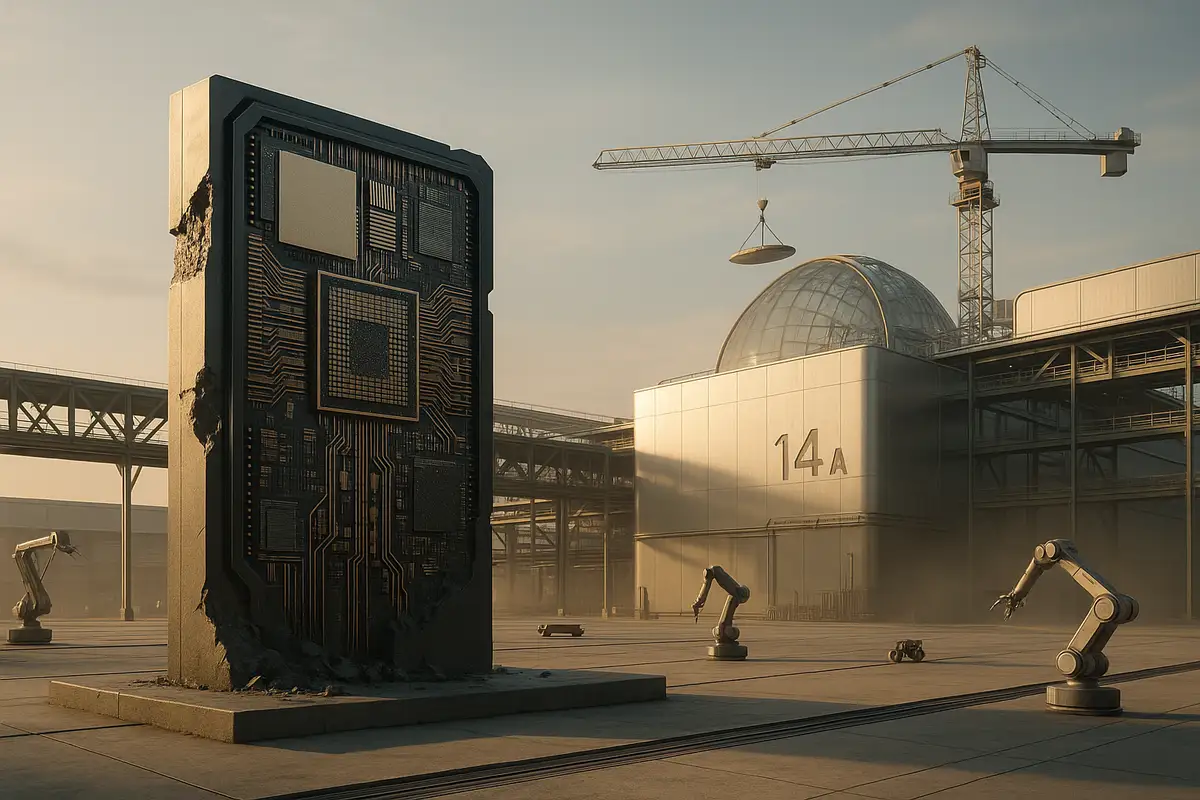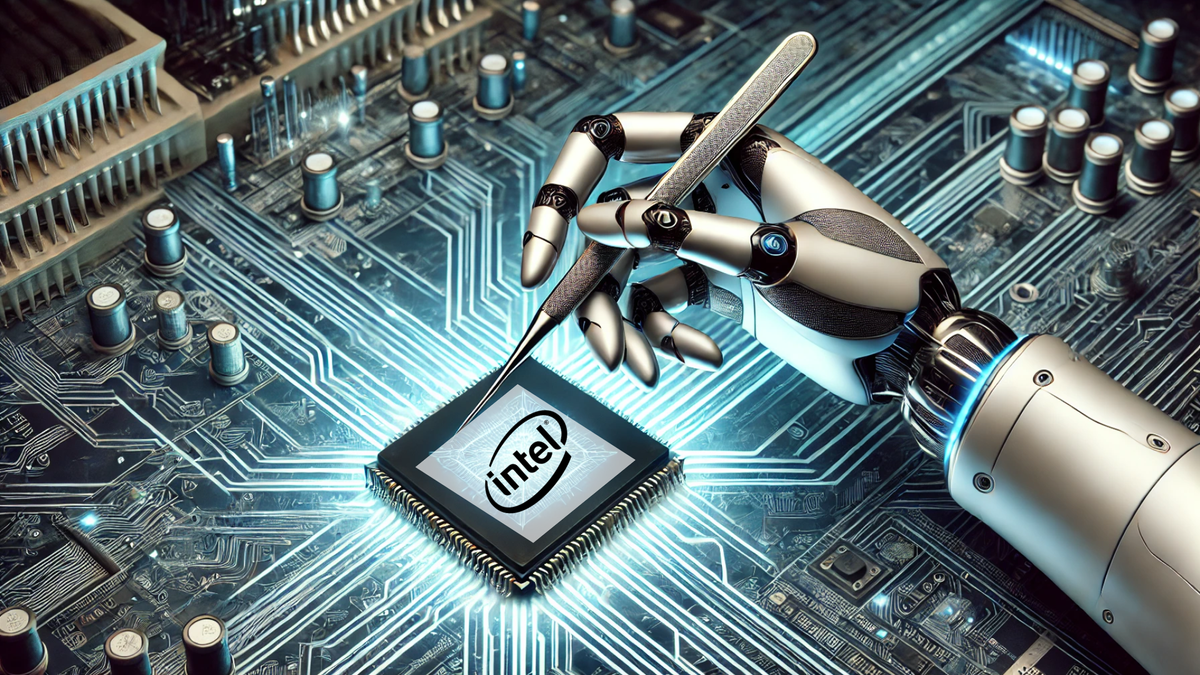💡 TL;DR - The 30 Seconds Version
🎯 Trump ordered Intel CEO Lip-Bu Tan to resign Thursday via Truth Social, calling him "highly CONFLICTED" over China investments—no evidence provided.
💰 Tan's former company Cadence just paid $140 million after pleading guilty to selling chip tools to a Chinese military university last week.
🔥 WSJ reveals Tan was already fighting his own board—they blocked his capital raise, killed an AI acquisition, and want to sell Intel's factories.
📉 Intel stock dropped 3.1% to $19.77; company worth $87 billion versus Nvidia's $4.4 trillion after missing the AI revolution entirely.
🏭 Intel got $8 billion in CHIPS Act funding but just delayed its Ohio fab until 2030s and cut 15,000 jobs last month.
⚡ Trump's intervention shows CEOs now face termination by Truth Social—a precedent that could reshape how tech navigates Washington's personal politics.
Thursday morning, 9:47 AM. Intel CEO Lip-Bu Tan was five months into rescuing America's most important failing chipmaker when Donald Trump decided he had to go.
"The CEO of INTEL is highly CONFLICTED and must resign, immediately," Trump wrote on Truth Social. "There is no other solution to this problem."
No evidence. No specifics. Just an executive death sentence, delivered in all caps.
The attack sent Intel's stock down 3.1% to $19.77. But here's the part Trump didn't know — or didn't bother to say: Tan was already fighting for his job against his own board of directors, according to people familiar with the matter who spoke to the Wall Street Journal.
The president's post didn't light the match. It just kicked the door open and let the wind in.
The Setup
Two days earlier, Senator Tom Cotton fired the first shot. The Arkansas Republican sent Intel's board a letter questioning Tan's history with Walden International — the venture firm he chairs that pumped $5 billion into over 600 companies. More than 100 of those were Chinese tech firms. At least eight had ties to China's military, Reuters reported in April.
Cotton also pointed to something more recent. Cadence Design Systems, where Tan was CEO from 2009 to 2021, had just pleaded guilty to selling chip design tools to China's National University of Defense Technology. The company paid $140 million to settle.
Actually, wait — the Justice Department gave them a 20% discount for "partial cooperation." Whatever that means.
The Chinese university? They used the software to simulate nuclear explosions.
"Intel is required to be a responsible steward of American taxpayer dollars," Cotton wrote. Fair point — the company got $8 billion in CHIPS Act funding.
By Thursday, the pile-on was underway. Ohio Senator Bernie Moreno wanted a fraud investigation. Rick Scott jumped in. Jim Banks too. Trump's post transformed a pointed inquiry into a political execution.
Intel's initial response was corporate wallpaper: Tan and the board are "deeply committed to advancing U.S. national and economic security interests."
Then Thursday night, Tan broke his silence.
Tan Fights Back
In a staff memo posted on Intel's website, he claimed the board's full backing. "We are engaging with the Administration to address the matters that have been raised and ensure they have the facts," he wrote.
Forty years in America. Always operated within legal and ethical standards. The usual defensive playbook.
Except.
He said the board supports him. People familiar with the matter tell a different story.
The Deeper Fight
Inside Intel's Santa Clara headquarters — that sprawling glass-and-concrete monument to Silicon Valley's better days — the real war started months ago.
Tan took over in March with one job: save the company that invented the microprocessor from drifting into irrelevance. Intel's market value had been cut in half since early 2024. TSMC was beating it at manufacturing. Nvidia had pulled far ahead in AI chips. The former king of semiconductors was worth $87 billion; Nvidia was pushing $4.4 trillion.
Part of the deal when he joined: divest his Chinese holdings, according to a person familiar with the arrangement.
Clean slate. Fresh start.
But Tan walked into a board already split on a basic, existential question — should Intel stay in the chip-making business at all?
Board chairman Frank Yeary, a former investment banker, had drawn up a plan to spin off Intel's manufacturing arm entirely. His blueprint? Sell pieces to Nvidia and Amazon, maybe even unload the whole thing to TSMC. You know, the very dependency Washington is desperate to avoid.
Tan pushed back. Intel's factories were the company's core and America's safety net. The foundry business was bleeding cash, sure, but it brought in a third of revenue and was the only U.S.-owned line of defense against total reliance on Asia's chipmakers.
The philosophical fight quickly turned practical.
Tan lined up Wall Street banks for a multi-billion-dollar capital raise. The board killed it, suggesting maybe 2026. He chased an AI acquisition to narrow the gap with Nvidia. Directors debated until a rival swooped in.
"There are no more blank checks," Tan wrote in a recent staff memo.
What he didn't add: the board had taken away his pen.
The China Problem
Tan's vulnerabilities weren't a secret.
Born in Malaysia, naturalized American, he built his fortune partly through Walden International. The venture firm invested at least $200 million in Chinese companies from 2012 to 2024 alone. But zoom out further: Walden had stakes in more than 100 Chinese firms over the decades, including Semiconductor Manufacturing International Corp.
SMIC. China's largest chipmaker now. Key partner to Huawei.
Tan served on SMIC's board for 15 years until 2018. In 2020, the Commerce Department blacklisted it for military ties. Tan was long gone by then.
Still, optics.
This wasn't Tan's first rodeo with Washington scrutiny. The House Select Committee on the Chinese Communist Party sent Walden a letter in 2023, demanding details about its China investments. Now Cotton was digging into Cadence, where employees had hidden a blacklisted Chinese military university as a customer during Tan's tenure.
The timing made everything worse. Tan had been making headway with Trump's people. In April, he met Commerce Secretary Howard Lutnick for an hour, discussed wooing Apple as a customer, even penciled in a follow-up.
Then came the Truth Social blast.
Pat Gelsinger, his predecessor, had cultivated Vice President JD Vance before leaving — a connection one ex-board member says could have softened the blow.
Too late for Tan.
What Actually Matters
Intel announced 15,000 layoffs last month.
Its much-touted Ohio fab is now delayed into the 2030s, long after the promised "semiconductor renaissance." The company's European ambitions are shelved. For a business once synonymous with Silicon Valley, the playbook is shrinking fast.
Bernstein's Stacy Rasgon summed it up: "Trump likes winners; we suspect he does not find the failure that has permeated Intel in recent years all that attractive."
Look, in Trump's Washington, a Malaysian-born venture capitalist with Chinese investments was always going to be a tough sell. But Tan's real handicap isn't his past — it's a present in which the board has tied his hands. And now the president has piled on.
Some administration officials are already losing patience. They want a flagship U.S. chipmaker to deliver independence, not delays and excuses. Meanwhile, TSMC and Samsung are expanding U.S. plants while Intel stalls.
"This is definitely a crisis point," said Ray Wang of Futurum Group. "All this disruption could only make things worse."
Tan doesn't need the job. He's rich from turning Cadence into a powerhouse during his 12-year run. The harder question: can Intel afford another leadership vacuum while hemorrhaging cash, talent, and relevance?
"He clearly wants to do what is best for Intel," Rasgon said. "And we suppose now he will have to ask himself whether or not resigning would be best for them."
Trump gave him 24 hours to think about it.
The board? If Tan's Thursday memo is to be believed, they're standing behind him. If the people talking to the Journal are right, they've been asking for months.
Either way, Intel's still bleeding. The president's still tweeting. And America's chip independence remains a PowerPoint deck away from reality.
In Silicon Valley, they'd call this disruption. In Washington, it's just Thursday.
Why this matters:
- Intel's leadership war lays bare a bigger fault line in U.S. chip strategy: even with billions in federal support, it can't agree if American manufacturing is worth saving.
- Tan's claim of board unity versus reports of internal revolt shows how a presidential broadside can force everyone to pick sides — or at least pretend to.
Update: August 8, 2025, 02:28 AM PT
- Added Tan's Thursday night response claiming board support.
- Included details on Walden International's $5 billion invested across 600 companies — over 100 in China
❓ Frequently Asked Questions
Q: Can Trump actually force a CEO to resign?
A: No legal power exists for presidents to fire public company CEOs. But Trump's pressure works—Amtrak's CEO resigned in March after funding threats, CBS News CEO left in May after Trump sued over a Kamala Harris interview. The real leverage comes from federal contracts, regulatory pressure, and making someone politically radioactive.
Q: What exactly did Cadence do that was illegal?
A: Cadence sold chip design software to China's National University of Defense Technology—a military institution believed to simulate nuclear blasts. The company pleaded guilty in July 2025 to violating U.S. export controls and paid $140 million. The sales happened between 2008-2021, when Tan was CEO.
Q: How many Chinese companies did Tan actually invest in?
A: Reuters found Tan invested at least $200 million in hundreds of Chinese tech firms between March 2012 and December 2024 through his venture fund Walden International. At least eight had ties to China's military. He claims he divested before joining Intel, but Chinese databases still listed many investments as current in April.
Q: What's Intel's foundry business and why does the board want to dump it?
A: Intel's foundry makes chips for itself and other companies—about one-third of Intel's revenue but loses money. Board chair Yeary wants to spin it off or sell to TSMC. Tan says keeping it is vital for U.S. semiconductor independence since TSMC and Samsung are foreign-owned.
Q: Has Intel actually gotten its CHIPS Act money yet?
A: Intel was awarded $8 billion—the most of any company—but the money isn't fully distributed. It's meant for facilities in Arizona, New Mexico, Ohio, and Oregon. Trump's Commerce Secretary Howard Lutnick is reworking CHIPS Act deals, wanting companies to pledge additional investments. Intel's financial troubles make new commitments difficult.
Q: Who takes over if Tan resigns?
A: Unknown. Tan only started in March after Pat Gelsinger was pushed out. Board chair Frank Yeary served as interim executive chair before. Intel's bench is thin after years of departures. Analysts say Tan was hired specifically for his "expertise and deep industry connections"—qualities hard to replace quickly.
Q: How bad is Intel's situation compared to competitors?
A: Catastrophic. Intel's worth $87 billion; Nvidia is $4.4 trillion. TSMC manufactures for Apple and Nvidia while Intel struggles to find customers. Stock down 60% since early 2024. Meanwhile, TSMC committed $165 billion to U.S. expansion, Samsung's building Texas fabs. Intel just delayed Ohio until 2030s.
Q: What's the Secure Enclave program Cotton mentioned?
A: A Biden-era defense initiative ensuring secure microelectronics supply for the military. Intel's involvement requires extensive security clearances and disclosure of foreign business ties. Cotton's questioning whether Tan properly disclosed his Chinese investments given Intel's role supplying chips to the U.S. military.












